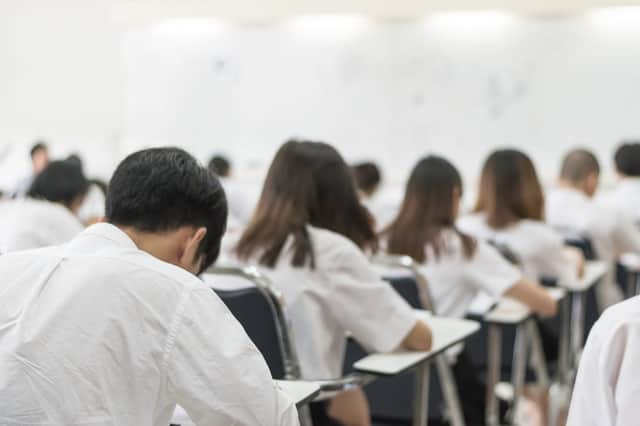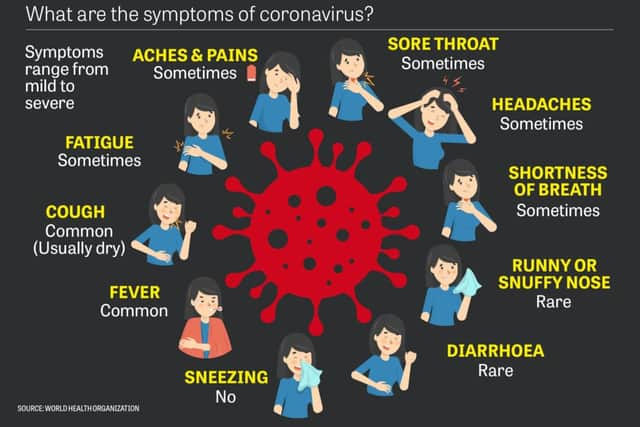Exams in Scotland have been cancelled - this is what you need to know


On Wednesday 18 March the government announced that UK schools would close to staff and most pupils from Friday afternoon until further notice as the coronavirus pandemic continues.
In England, GSCE and A-Level exams have been cancelled - and now Scottish Highers and National 4 and 5 exams have been called off as well.
Here’s what you need to know.


When will schools in Scotland close?
Advertisement
Hide AdAdvertisement
Hide AdFirst Minister Nicola Sturgeon announced on Wednesday (18 Mar) that schools and nurseries would close on Friday 20 March, and it was unclear whether they would reopen following the Easter Break.
The FM said: “My view is that it is now inevitable that we will close schools and nurseries.
“My planning assumption is that schools will close to pupils at the end of the week. I wanted today to give parents notice of that.”
Education secretary John Swinney also confirmed the news, saying that the measures “will be very disruptive” but “necessary”.
Advertisement
Hide AdHe added: “We are working with Councils to support young people preparing for SQA exams, are vulnerable and whose parents are essential workers.”
Have exams been cancelled?
Advertisement
Hide AdExams in Scotland have officially been cancelled for the first time in Scottish history.
Mr Swinney said: “In all of our history Scotland has never cancelled the exams. Since 1888 they have been held every May and June without fail.
“In the midst of two world wars the exams went ahead. It is a measure of the gravity of the challenges we now face that I must today announce that the exams will not go ahead.”
Advertisement
Hide AdMr Swinney said that a model would be put into place to ensure that the young people whose exams are now cancelled will not in any way be disadvantaged when applying to colleges and universities.
(Photo: WHO)
If exams are cancelled, how will students be graded?
It is likely the pupils will be graded on the merit of their coursework and teacher judgement.
Advertisement
Hide AdFiona Robertson, the SQA Chief Executive and Scotland’s Chief Examining Officer, said: “What I can say now is that we want to ensure that we have as much information on the achievements of learners as possible.
That is why the Deputy First Minister has asked schools and colleges to continue to work with young people to ensure that any units and coursework are completed and estimated grades are provided by teachers, drawing on the available evidence gathered throughout the year, to SQA’s existing deadlines, or earlier if that is possible.
Advertisement
Hide Ad"For many learners, we will also have prior attainment information which will be helpful to us."
When will pupils receive their qualifications?
There has been no further information regarding when pupils can expect to receive their qualifications, but more details are due to be released.
More information is expected to be revealed before the end of the week.
Coronavirus: the facts
What is coronavirus?
Advertisement
Hide AdCOVID-19 is a respiratory illness that can affect lungs and airways. It is caused by a virus called coronavirus.
What caused coronavirus?
Advertisement
Hide AdThe outbreak started in Wuhan in China in December 2019 and it is thought that the virus, like others of its kind, has come from animals.
How is it spread?
As this is such a new illness, experts still aren’t sure how it is spread. But.similar viruses are spread in cough droplets. Therefore covering your nose and mouth when sneezing and coughing, and disposing of used tissues straight away is advised. Viruses like coronavirus cannot live outside the body for very long.
What are the symptoms?
The NHS states that the symptoms are: a dry cough, high temperature and shortness of breath - but these symptoms do not necessarily mean you have the illness. Look out for flu-like symptoms, such as aches and pains, nasal congestion, runny nose and a sore throat. It’s important to remember that some people may become infected but won’t develop any symptoms or feel unwell.
What precautions can be taken?
Washing your hands with soap and water thoroughly. The NHS also advises to cover your mouth and nose with a tissue or your sleeve (not your hands) when you cough or sneeze; put used tissues in the bin immediately and try to avoid close contact with people who are unwell. Also avoiding touching eyes, nose and mouth unless your hands are clean.
What should I do if I feel unwell?
Advertisement
Hide AdAdvertisement
Hide AdStay at home if you have either:- a high temperature – this means you feel hot to touch on your chest or back (you do not need to measure your temperature)- a new, continuous cough – this means coughing a lot for more than an hour, or 3 or more coughing episodes in 24 hours (if you usually have a cough, it may be worse than usual)- Do not go to a GP surgery, pharmacy or hospital.- Use the 111 online coronavirus service to find out what to do.